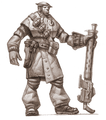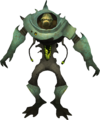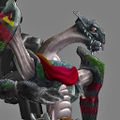Invasion
| Invasion | |
|---|---|
| 250px | |
| Basic Information | |
| Developer: | |
| Engine: | |
| Genre: |
First-person shooter |
| Modes: |
Multiplayer |
| Designer(s): |
Valve |
| Platforms: |
Windows |
Invasion is a Team Fortress 2 pre-release design concept. It was a War of the Worlds steampunk and sci-fi inspired game featuring a war between humans and aliens. This iteration was more of an extended development on Team Fortress 2: Brotherhood of Arms with a different theme rather than a phase entirely.
Contents
- 1 Early Development
- 2 Gameplay
- 3 History
- 4 Classes
- 5 Buildings
- 5.1 Respawn Station
- 5.2 Powerpack
- 5.3 Resource Pump
- 5.4 Sandbag Bunker
- 5.5 Bunker
- 5.6 Dragon's Teeth
- 5.7 Tower
- 5.8 Tunnel
- 5.9 Barbed Wire
- 5.10 Buff Station
- 5.11 Manned Plasma-Gun
- 5.12 Manned Missile Launcher
- 5.13 Explosives
- 5.14 Resupply Station
- 5.15 Shield Wall
- 5.16 Manned Shield
- 5.17 EMP Generator
- 5.18 Mortar Launcher
- 5.19 Rallyflag
- 6 Gallery
- 7 See also
Early Development
Early in Invasion's life, the game was much like Brotherhood of Arms in terms of classes and gameplay, but with a futuristic sci-fi theme. Over time, this changed greatly when Aliens were added, and the futuristic sci-fi theme was scrapped to make way for a futuristic Humans vs Aliens, with the designs being largely Roman-inspired, despite still being futuristic. At some point, the game became more focused on territory control and introduced Resources for the first time. Shortly following this, Moby Francke joined Valve and designed the War of the Worlds-inspired Invasion pre-release Team Fortress 2 designs (and, later, the release designs). Originally being less World War I inspired with the Humans, and more retro-steampunk in design, with the Aliens looking less advanced and more primitive than seen in later concepts.
Brotherhood of Arms
Invasion stems from none other than the Brotherhood of Arms phase of development. Evidence of this can be found in the 2003 leak's Source Code, in which some leftover Brotherhood of Arms code can be found. such as tf_accuracy.cpp, which was removed because it was deemed too complicated and could be done in an easier way according to code comments. The Officer class from Brotherhood of Arms was removed, and instead converted into the Rallyflag and his morale effects became the Adrenalin power-up. As such, it's safe to say the only thing that ever changed for Team Fortress 2 was gameplay objectives, art style, and theme. Of course, gameplay was also shaped by the theme and art style which added in key differences.
Commander
The Commander class is still present in Invasion, but all classes can utilize it as it morphied into a feature called Tactical View. The Tactical View allowed players to give orders to other teammates, witness the battlefield from above, and various other things. The Orders feature originated from Brotherhood of Arms and is still one of the many things from that point of development to survive up until Invasion.
Gameplay
The average Invasion game consists of two teams - the Humans and the Aliens, with a game split up between three 15-minute rounds known as Acts. Gameplay is largely based around the collection of "Resources," called "Jojierium". Resources are chunks that can be picked up by players, which are then added to the Resource bank of their team. There are various ways for players to acquire chunks of Resources, including killing enemies, destroying enemy objects, or collecting from a Resource Pump.
The teams have two key differences; the Humans require power for their buildings to function, and as such have objects that cost less. The Aliens don't require power and as such, buildings are more expensive.
The game revolved around controlling territory of the map known as "Control Zones", which houses Vehicle Bays and Resource Zones that can be utilized by the controlling game. Teams would defend and conquer this territory using buildings and their classes' various abilities. As such, these maps were big, and utilized vehicles to traverse the world.
Winning a game of Invasion could be done in two ways, the first type of victory is given to the team that owns the most Resources within their Resource bank. The second method of victory only occurs if a team has no Respawn Stations build, and without Respawn Stations, your team cannot respawn. With this factor, destroying all the Respawn Stations of the enemy team, then killing every enemy player, would result in a victory.
Another point of interest is that the Sappers the Spy class in the final Team Fortress 2 utilizes stems from Invasion. The Sapper, unlike in Team Fortress 2, could be used by all classes, and was placed much like a C4 in Counter-Strike. This was probably added to balance out how players could destroy enemy buildings.
Technology
Technology was a key gameplay feature, allowing a team to upgrade itself to gain new abilities and advantages for themselves. Technology could be gained by votes, done by the Team. After gaining all the Technologies in one Tech Level, you would unlock the next. There was 6 Tech Levels across all 10 classes; That's 60 Technologies available for a team.
HUD
The Heads-up display in Invasion was very important. Resources were displayed alongside Health, Ammo, and an Act Timer. The Weapons could be selected just like in every other game, as well as Buildings divided by category. There was a Minimap as well that acted as a guide for the player, and could be zoomed in. Orders would pop up on the screen as well, and if you just started playing, you would get Tips based on what class you were playing, what weapon you were using, what team you were on, and what your crosshair was hovering over. This was added to help teach players how to play in detailed fashion alongside gameplay without the need for a tutorial.
History
When the Half-Life 2 source tree was leaked in late 2003, two models of the Team Fortress 2 Commando class were included, along with the Team Fortress 2 source code, which was fully compilable.
In the end, this build was completely scrapped and only select things in this version would appear in the final version of Team Fortress 2. One of the Developer Commentaries in the final version of Team Fortress 2 mention that they had made the game too complex. Instead, the team took a completely different direction when they began making the next build; instead of trying to make a large, RTS-like FPS game, they went back and streamlined the Classic Team Fortress games for a new generation of gamers, then added a unique art style. This iteration was mentioned in an August 2007 interview with Gabe Newell by GameTrailers and a September 2010 interview with PC Gamer, in which he mentions "Invasion" as being the second phase of Team Fortress 2's development under Valve Software.
Classes
This game housed 10 classes, with 9 of them slightly resembling their counterparts from Team Fortress Classic, with one being all-new.
Commando
Medium class, armed with a Chargable Plasma Rifle, a few Plasma Grenades and a Combat Shield. Had "adrenalin rush" ability, which would increase the Commando's health, speed, and damage resistance for a short duration. Could also perform an Adrenalin Rampage (bull rush with shield, similar to Chargin' Targe), and had a Battlecry that acted as a less-effective Adrenalin Rush but would be applied to any teammates that could hear the Battlecry. This seems to be the only class that was finished.
Defender
A class, similar to Engineer, equipped with a Laser Rifle and a Combat Shield. Was to build sentry guns. Could gain technologies: increased sentry gun count (could build one sentry gun by default, would increase this number to 3), improved sentry AI, improved sentry sensors and rockets for sentry gun (by default sentries had plasma guns), and also could unlock weaponry through technology, such as the Welder, which could weld doors shut in maps, but could be knocked down with the Commando's Bull Rush. And could repair buildings much like the Medic, but lacking it's higher effectiveness range.
Infiltrator
A class similar to Spy. Could silently assassinate enemy players using a knife, disguise as enemy players, consume corpses, (if gained the technology for corpse consuming) eavesdrop on enemy voicechat and teamchat when in range of them, and had thermal vision, a bullet-firing and a limpet-firing weapon.
Medic
A combat medic. Armed with a Repair Gun and Plasma Rifle, this class could heal players and buildings, and with special technology, apply upgrades to it's teams buildings that allow them to repair themselves at a slow rate. The medic's health regenerated at around 10 HP per second.
Pyro
An equivalent for Pyro, equipped with a flamethrower, which could set things ablaze for a short period of time. Also armed with a Gas Can, a useful tool for trapping enemies in flames.
Recon
The class with the most mobility without the aid of a Vehicle, similar to Scout. Armed with Dual Semi-Automatic Pistols, Had 25% more speed than most of other classes, and could throw Sticky Grenades that attach to any unfortunate enemies that come in contact with it. This class could Double Jump, but not like the Scout in the final game, as this Doublejump gives more of a boost towards whatever direction the player would be looking at. Also could jump on walls using an Ability called the Suppression Jump, which would force you down after being on the wall for too long. Could gain radar scanner technology.
Sapper
Originally called the Technician, this class is named after the real-life Sappers that were utilized in World War 1 under the same name. This class specializes in sabotaging enemy buildings using EMP attacks & devices, that could be improved in range and effectiveness time through Technology upgrades. Armed with the Drainbeam, a weapon that is the polar opposite to the Medic's Repair Gun. This weapon would drain health from enemies and enemy buildings, and use that health to fill a meter for Boosts, which could boost speed and health for the Sapper or it's teammates for a short amount of time. Also armed with a Shotgun exclusive to this class that outputs higher damage.
Sniper
Despite no code for the weapon being in the game, it's presumed this class would wield a Sniper Rifle. Could gain camouflage technology.
Support
The Support uses Mortar Strikes to suppress enemies and specializes exclusively in explosives, armed with a Grenade Launcher and Rocket Launcher (Bazooka). Similar to Soldier. Mortars came in multiple round types, (which could be unlocked from Technology Upgrades) from Smoke Rounds, that did minimal damage but covered enemies in smoke, to Starburst Rounds, that blinded enemies much like the Flash-bang in Counter-Strike, and finally to the Cluster (MIRV) Rounds, which split up into two mid-air for more damage and impact spread.
Escort
This class is an all new class equivalent to the Heavy with more focus on defense. This class can use it's Power Shield to block enemy fire, which can loose power as it absorbs damage. When all power is lost, the Power Shield will turn off and will recharge itself for later use. Armed with a Minigun, which provided high damage much like it's counterparts, but lacked much range as a compromise. Another ability only this class uses is the Harpoon, which could be thrown at enemies, and impale them, allowing the player to pull the impaled foe towards them. It also provided a melee attack as a secondary fire which allowed the player to punch forcefully at enemies.
Buildings
Unlike in other iterations of Team Fortress 2, this iteration allowed all classes to build.
Respawn Station
All classes could build this device, which allowed teammates to respawn. More of these would grant less respawn time.
Powerpack
This was used to power up to four buildings at a time, exclusive to the Humans.
Resource Pump
Used to harvest resources from Resource Zones. Also referred to as a Harvester within the code.
Sandbag Bunker
A weak bunker that players could use to avoid enemy fire. But could be destroyed.
Bunker
Stronger and bigger Bunker than the Sandbag Bunker.
Dragon's Teeth
Used to block vehicles from accessing pathways or areas.
Tower
A tower that provides a nice view for players with long-ranged weapons.
Tunnel
Much like the Teleporter in Team Fortress 2, except instead of teleporting players, it was a tunnel you dug up. You could destroy entrances and exits of this but never is fully destroyed. It took time to travel these and sometimes you would hear footstep sounds.
Barbed Wire
This was useful for blocking pathways from enemy forces. Placing two of these next to each other would generate a deadly laser field in-between them.
Buff Station
A Medic Exclusive, this would give the player a boost in health and weapon damage when plugged in. Could buff up to four players simultaneously. Walk too far away and the player would be unplugged.
Manned Plasma-Gun
A stationary Plasma Cannon controlled by players
Manned Missile Launcher
A stationary Missile Launcher that has higher damage outputs than the Plasma-gun but with a slower fire rate.
Explosives
This trap could be placed on any building, and would explode when the building gets destroyed.
Resupply Station
Another Medic exclusive. This would resupply ammo, rockets, and grenades in exchange for Resources.
Shield Wall
A Wall that can act as defense or block pathways.
Manned Shield
A Shield that can be rotated if a player was to man the shield.
EMP Generator
This would EMP any enemy devices within range for a select period of time, and even nullify class features temporarily.
Mortar Launcher
Used by the Support class to launch his Mortar Rounds.
Rallyflag
Exclusive to the Commando. Emits Adrenalin that boosts any nearby teammates while the Building is still alive, but will remove these effects when destroyed.
Gallery
See also















